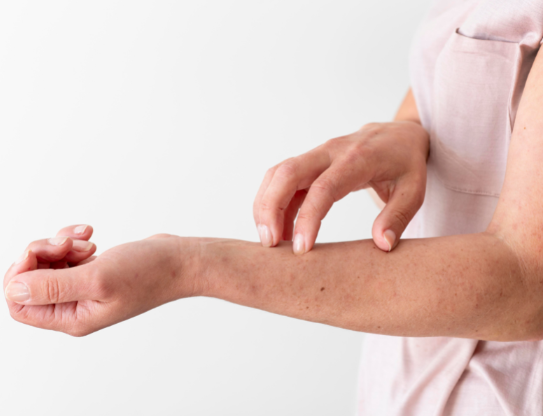
Skin diseases:- The biggest organ in the human body is the skin. Skin disease is any disorder or condition that affects the skin. However, keep in mind that skin diseases and treatments can vary greatly in severity and symptoms. While some skin conditions are discovered to have environmental origins, others may have inherited reasons.
Human skin is a large organ that covers and protects the body. It serves varied functions like:
Stabilising body temperature
Holding in fluid and preventing dehydration
Keeping out bacteria, viruses and other causes of diseases
Synthesising vitamin D
Feeling different sensations, such as pain and temperature
Some of the most common causes of skin diseases include:
Allergens, irritants, and infected skin
Immune system compromise
Hereditary factors
Hair follicles and skin pores are infected with bacteria
There are several types of viruses
Parasites, fungus, or other microorganisms surviving on the skin
Acne: Acne is a skin condition that occurs when hair follicles are clogged with sebum, bacteria and dead skin cells. It manifested as whiteheads, blackheads or pimples. Acne is most commonly present on the face, forehead, chest, shoulder and upper back.
Dermatitis: This is an inflammation of the skin which can take many forms, such as rashes, dandruff and eczema. Environmental change, family history, allergens and irritants are some of the causes of dermatitis.
Eczema: Usually occurring in infants, eczema causes a part of the skin to swell and become dry, red, cracked, itchy, and cracked.
Psoriasis: Psoriasis is an autoimmune disease that is characterised by red, itchy scaly patches. The plaques are thick, dry, and discoloured skin. These patches crack sometimes and bleed. This occurs when the immune system overreacts
Keratosis Pilaris: A skin diseases, harmless skin condition, keratosis pilaris causes dry, rough patches on the upper arms, thighs, cheeks, and buttocks.
Melanoma: Melanoma is a serious kind of skin cancer that frequently resembles a benign mole. Any part of your body can develop melanomas. Your back, legs, arms, and face are the places where they often appear because of sun exposure.
Lupus: This autoimmune condition affects several body organs, including the skin, lungs, and kidneys. Lupus frequently manifests as a thick, scaly patch on the face, a large rash on the back, a sore in the mouth or nose, or a sunburn-like flare-up. Stress, sunshine, and UV light are common triggers.
What dietary and lifestyle changes may be made to avoid skin diseases?
If you have one of these skin problems, adopting the right preventive actions might help slow the condition's spread or lessen its symptoms. Commonly advised preventative steps include:
Using wet wipes
Drink a lot of water
People with skin infections should avoid direct contact.
You should never share drinking glasses or eating utensils.
Avoid excessive emotional or physical stress.
Eat a balanced and nutritious
Smoking, drinking alcohol, and other bad habits should be avoided
Avoiding scratching affected areas
Taking a bath daily
Keeping the affected area covered
Excessive exposure to sunlight should be avoided
Using anti-allergy medication
Wearing cotton clothes that are comfortable
Use skin moisturizer.
To avoid skin disorders, eat a healthy diet. The physiology of our human body, including the skin, is affected by the foods we eat. Skin diseases can be prevented by eating the following foods:
Sweet potatoes: Rich in beta-carotene, they protect our skin from harmful sun rays.
Walnuts: Rich in essential fats, vitamin E,zinc, selenium, and proteins, walnuts help keep our skin healthy and young.
Fatty fishes: Healthy skin can be achieved by eating fish rich in omega-3 fatty acids and vitamin E. The omega-3 fatty acids keep the skin well moisturised, hydrated, and firm, and vitamin E protects it.
Avocados: Avocados contain healthy fats that keep the skin moist and flexible.
Sunflower seeds: They contain antioxidants that protect the skin from free radical damage.
Best Treatment For Skin Diseases.
Take treatments by a dermatologist:-
A dermatologist diagnoses and treats diseases of the skin, hair, nails, and mucous membranes. Dermatologists can also be surgeons. Some of the most common conditions a dermatologist may treat include acne, eczema, hair loss, nail fungus, psoriasis, skin cancer and rosace etc.
A dermatologist may be able to help you with the following symptoms: rash, hives, scars, eczema, psoriasis, rosacea, long-lasting skin irritation, warts, and a patch of skin or a mole has changed in size, colour or shape.
We have given the best treatment of skin diseases to our expert dermatologist in Yamuna Vihar, Delhi. If you going to a dermatologist you can prepare:-
Make a list of the most important issues you want to discuss with your dermatologist.
If your health changes, note it.
Get to know the medical history of your family.
Make sure you wear loose clothing so that your dermatologist can easily examine you.
You know about allergies.
Makeup and nail polish should be avoided.
Skin Treatment In Yamuna Vihar, Delhi
Treatments of skin diseases vary from patient to patient so is the cost. By examining the skin condition our dermatologist can suggest the best treatment for every patient and estimate the cost.
Learning to differentiate between the many skin disorders is helpful, but a dermatologist's correct diagnosis and treatment are what matter most in this case. Yes, although the majority of skin conditions are minor, some point to more serious problems and the need for medical attention.
Book an appointment with a skin doctor at At Aggarwal’s wellness multispeciality hospital.